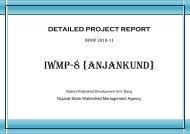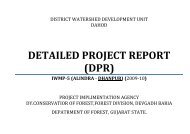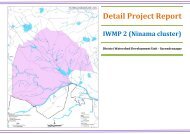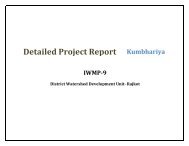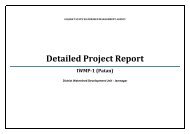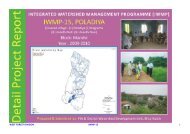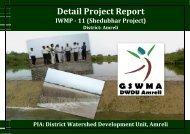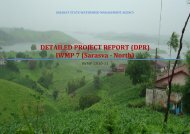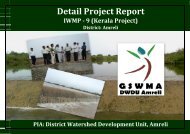IWMP-2 - Commissionerate of Rural Development Gujarat State
IWMP-2 - Commissionerate of Rural Development Gujarat State
IWMP-2 - Commissionerate of Rural Development Gujarat State
You also want an ePaper? Increase the reach of your titles
YUMPU automatically turns print PDFs into web optimized ePapers that Google loves.
<strong>IWMP</strong>-2 Mahiyari<br />
Watershed Activities<br />
Watershed management as a strategy has been adopted by Government <strong>of</strong> India especially in the rain-fed regions <strong>of</strong> semi-arid tropics. These<br />
regions are characterized by low and undependable rain, low soil fertility, poor infrastructure development, low literacy and high incidence <strong>of</strong><br />
migration. Several studies have identified that there is a dire need <strong>of</strong> a systematic and scientific approach to deal with watershed development.<br />
The common guidelines generate a fresh and flexible framework for the next generation watershed development.<br />
4.1. Scientific Planning:<br />
i) Cluster Approach<br />
This envisages a broader vision <strong>of</strong> Geo-hydrological unit which involves treating a cluster <strong>of</strong> micro-watershed. The Mahiyari Project consists <strong>of</strong><br />
four micro- watersheds namely 5G1C1a2a, 5G1A6a1d, 5G1A6a1e as their respective codes. Further Mahiyari watershed project is in<br />
continuation with other watershed projects.<br />
ii) Base line Survey<br />
To access the impact <strong>of</strong> any watershed development programme a detailed baseline survey has to be conducted. This acts a benchmark for any<br />
intervention during and post implementation <strong>of</strong> any development programme. A detailed baseline survey was undertaken which involved<br />
household census survey, Bio-physical survey and Village level data collection from Talati –cum mantri. Household census survey includes a<br />
detailed questionnaire which was been filled by visiting each and every household in the village. This gave in the details <strong>of</strong> the demographic<br />
pr<strong>of</strong>ile <strong>of</strong> the village, the literacy percentage, SC/ST population, number <strong>of</strong> BPL household, cattle population, net consumption rate in the<br />
village, average milk production <strong>of</strong> the cattle and various schemes running and their benefits<br />
District Watershed <strong>Development</strong> Unit, Porbandar



